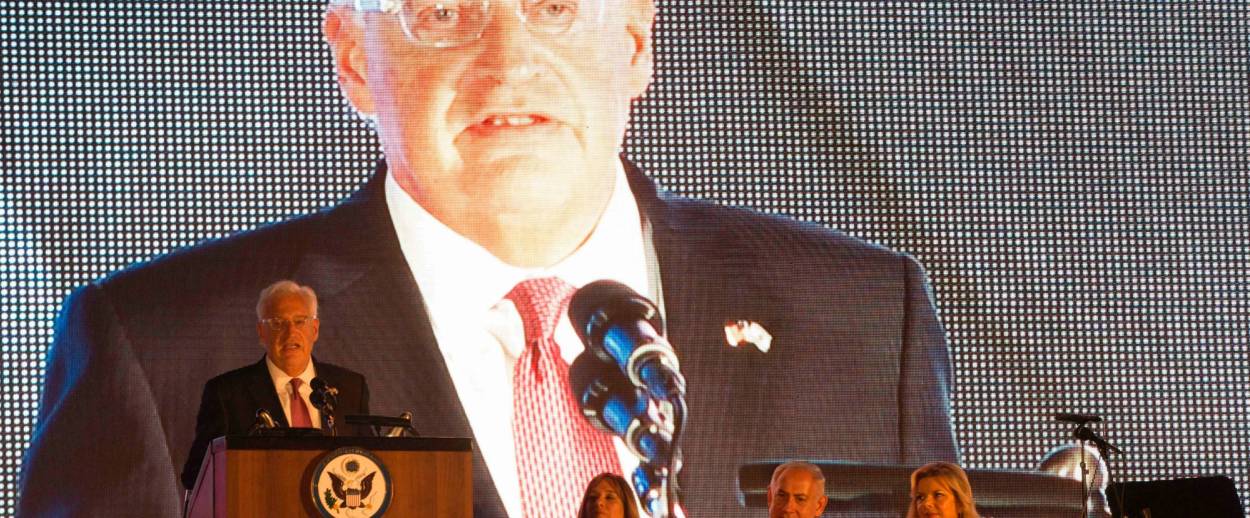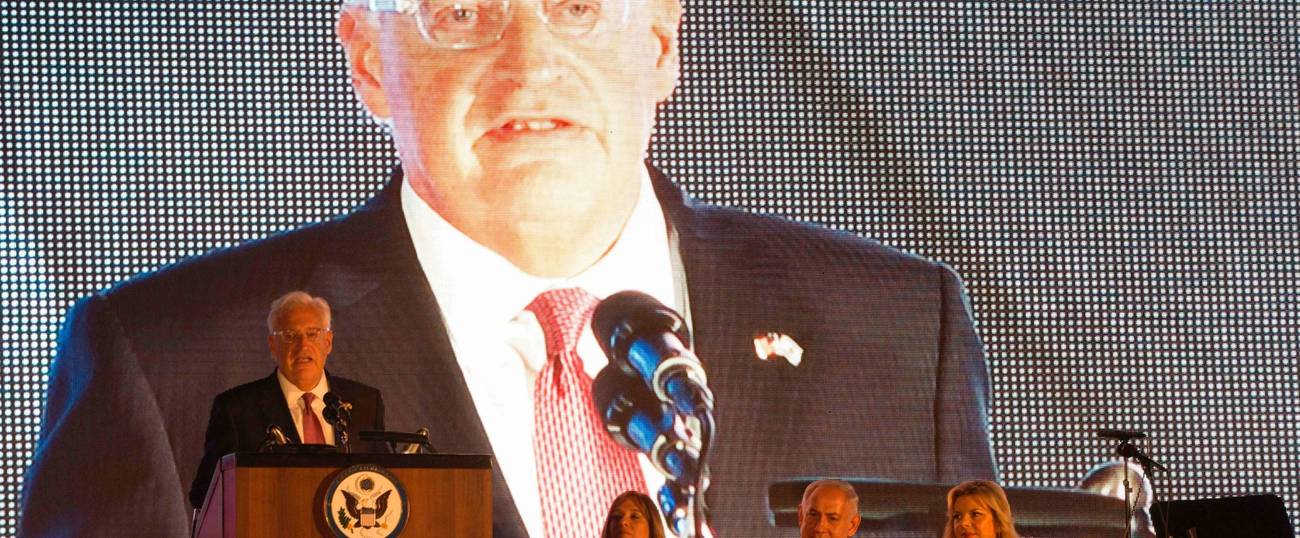Last week, the Trump administration’s ambassador to Israel David Friedman set off a public controversy—pitting the US Ambassador to Israel against the US State Department and the Palestinian Authority—when he told an Israeli journalist that “the settlements are a part of Israel.”
No way, said Nabil Shaath, a senior advisor to Palestinian Authority President Mahmoud Abbas. “This alleged ambassador of the United States,” said Shaath, “has absolute ignorance of facts of law of the position of the United States.”
US media reports charged that Friedman’s comments marked a “break with almost 25 years of American policy advocating a two-state solution to the Israeli-Palestinian conflict.”
In Washington, State Department spokesperson Heather Nauert scrambled to stanch the bleeding and suggested that other Trump officials, like the president’s son-in-law Jared Kushner and Middle East envoy Jason Greenblatt had a better handle on US policy than the US Ambassador did. In any case, Nauert said, Friedman’s remarks do “not indicate a shift in US policy.”
Nauert is right—sort of. And therein lies the rub. Friedman’s comments do indeed reflect longstanding US policy, which is rooted in UN Resolution 242, whose carefully-worded language referring to a future peace based on Israeli withdrawal “from territories occupied” in the 1967 conflict in exchange for “secure and recognized borders”—meaning borders that were different than the prior 1967 lines—was drafted by the US in the face of demands for an Israeli withdrawal from “the territories” or “all territories,” as suggested at various points by the British, the French, the Soviet Union, and various Arab states, led by Egypt.
The point of the American insistence on not specifying the extent of a future Israeli withdrawal, as Friedman explained in the interview last week, was that “Israel would be entitled to secure borders. The existing borders, the 1967 borders were viewed by everybody as not secure. So Israel would retain a meaningful portion of the West Bank—and it would return that which it didn’t need for… peace and security.”
Again, Friedman is clearly correct. Israel’s occupation of the West Bank was never defined as illegal by U.N., nor is there any obligation for Israel to withdraw from the territories in the absence of a comprehensive peace with the Arab states (the Palestinians are never mentioned in Resolution 242). As Soviet deputy foreign minister Vasily Kuznetsov himself admitted after Resolution 242 was adopted, “There is certainly much leeway for different interpretations that retain for Israel the right to establish new boundaries and to withdraw its troops only so far as the lines it judges convenient.”
In fact, the consensus that Israel would not withdraw from the entire West Bank was shared by American Presidents for forty years across party lines. As Raphael Medoff has explained “Lyndon Johnson and Ronald Reagan … denounced the 1967 lines as indefensible,” and Bill Clinton “shied away from mentioning the 1967 lines,” and noted that a Palestinian state would have to “accommodate Israel’s security requirements and the demographic realities.”
The George W. Bush administration that enshrined this policy with the April 2004 exchange of letters between the US president and then Israeli prime minister Ariel Sharon. With Israel’s disengagement from Gaza and parts of the West Bank, Bush wrote to Sharon:
As part of a final peace settlement, Israel must have secure and recognized borders, which should emerge from negotiations between the parties in accordance with UNSC Resolutions 242 and 338. In light of new realities on the ground, including already existing major Israeli populations centers, it is unrealistic to expect that the outcome of final status negotiations will be a full and complete return to the armistice lines of 1949, and all previous efforts to negotiate a two-state solution have reached the same conclusion. It is realistic to expect that any final status agreement will only be achieved on the basis of mutually agreed changes that reflect these realities.
So why are the PA, the US press, and many of Nauert’s colleagues in Foggy Bottom portraying Friedman’s remarks as a shocking departure from longstanding US policy? Because the Obama administration attempted to reverse that policy, while pretending otherwise.
Early in its first term, the Obama administration made clear it did not recognize the Sharon letter. In June 2009, Secretary of State Hillary Clinton said, “in looking at the history of the Bush administration, there were no informal or oral enforceable agreements. That has been verified by the official record of the administration and by the personnel in the positions of responsibility.”
Bush’s Deputy National Security Adviser Elliot Abrams, who helped draft the letters, corrected the record:
Not only were there agreements, but the prime minister of Israel relied on them in undertaking a wrenching political reorientation — the dissolution of his government, the removal of every single Israeli citizen, settlement and military position in Gaza, and the removal of four small settlements in the West Bank. This was the first time Israel had ever removed settlements outside the context of a peace treaty, and it was a major step.
“For reasons that remain unclear,” Abrams continued, “the Obama administration has decided to abandon the understandings about settlements reached by the previous administration with the Israeli government.”
In May 2011, Obama contended that the borders of a Palestinian state “should be based on the 1967 lines with mutually agreed swaps.” When former Israeli ambassador to the United States Michael Oren wrote in his book Ally that this marked a shift in American policy, former Obama aide Philip Gordon argued that this was the position of previous Democratic and Republican White Houses. But that statement was plainly false.
In December 2016, the Obama administration broke with longstanding US practice of vetoing anti-Israel resolutions. UN ambassador to the UN Samantha Power abstained from voting on UN Security Council resolution 2334, which declares all Israeli settlements illegal under international law, and demands that Israel cease construction in the West Bank and other territories captured in the 1967 war. In failing to veto UNSCR 2334, the Obama administration abrogated not just the Sharon letter, but also longstanding US policy, premised on UNSCR 242, that acknowledged there was no going back to the 1949 armistice lines.
The Trump administration, as Ambassador Dennis Ross explained shortly after the 45th president took office, was likely to restore the understandings laid out in the Sharon letter, and return to what had in fact been longstanding US policy—before Obama changed it. That’s precisely what Friedman was doing last week in his interview—and that’s exactly why the PA and the press jumped down his throat.
As a matter of historical fact, Ambassador Friedman is 100 percent correct. The failure of the US State Department to openly back him suggests a troubling lack of institutional memory—and a troubling lack of political discipline coming from the top.

